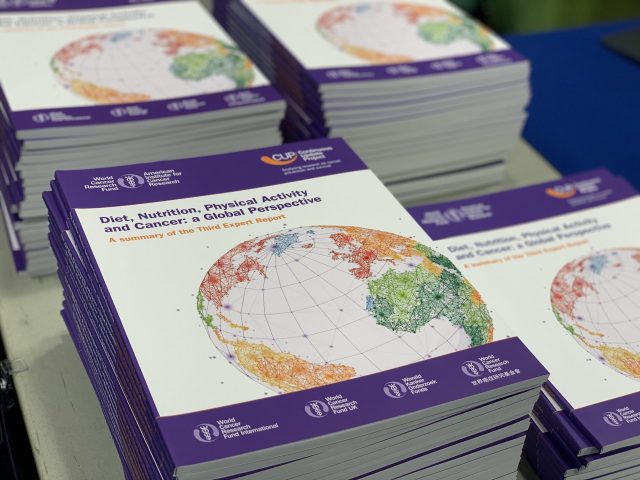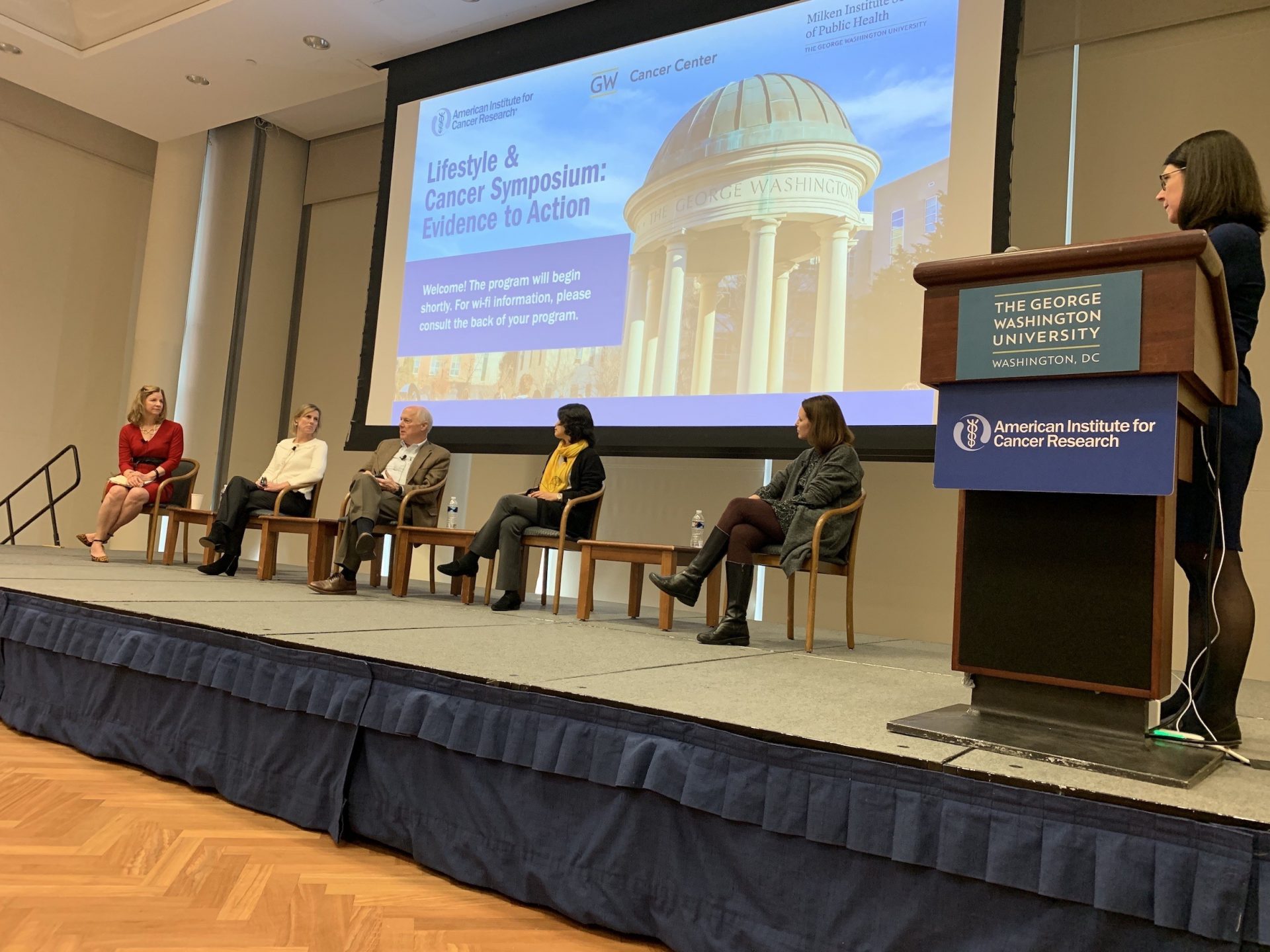AICR’s Lifestyle & Cancer Symposium: Evidence to Action, held on January 24, 2020, addressed the gap between what we know about the connection between lifestyle and cancer risk and how that knowledge can be used to reduce cancer risk and improve health, both at the individual and population levels. This symposium was presented in partnership with the George Washington University’s Milken Institute School of Public Health and the George Washington University Cancer Center. Consistent with the symposium’s tagline, “Evidence to Action,” it explored research, policy and population-based strategies, and real-life tips for assessing and implementing AICR’s Cancer Prevention Recommendations.

The symposium began with an overview of AICR and the World Cancer Research Fund’s (WCRF) Continuous Update Project (CUP) evidence review process and Cancer Prevention Recommendations from AICR’s Vice President of Research, Dr. Nigel Brockton. The CUP is an ongoing systematic analysis of global research on how diet, nutrition and physical activity affect cancer risk and survival. It was followed by a presentation from Jill Reedy, PhD, MPH, of the National Cancer Institute on how these recommendations can be operationalized. The WCRF/AICR score is a number from 0 to 7 or 8 that assesses how well the cancer prevention recommendations are being met. For example, a full point is awarded for meeting AICR’s recommendation of limiting sugar-sweetened beverages if no sugar-sweetened beverages are consumed, and partial credit is given for having less than one drink per day. The WCRF/AICR score can be used to assess the relationship between meeting the cancer prevention recommendations and health outcomes.
The next three presentations focused on programs, policies and other strategies for implementing AICR’s cancer prevention recommendations at the population level. Fang Fang Zhang, MD, PhD, with Tufts University spoke about the diet-associated cancer burden in the U.S. and the implications for policy interventions. Her team’s research examined the impact of nutrition policies to improve diet quality across the population. For example, she presented data showing that nutrition policies such as menu labeling, including added sugar information on the Nutrition Facts label, and taxing sugary drinks combined could prevent thousands of cancer cases and deaths. Several of these policies would also save money.
Melinda Irwin, PhD, MPH, with Yale University spoke about the benefits of physical activity for cancer prevention and survivorship. She emphasized the importance of physical activity in improving quality of life and reducing treatment-related side effects for cancer survivors. Dr. Irwin also provided several recommendations, such as increasing access to physical activity programs like Livestrong at the YMCA.
Bill Dietz, MD, PhD, with the George Washington University, addressed the lack of knowledge and competency of health care providers in treating people with obesity. He noted that providers often don’t discuss weight loss due to lack of time, a belief that the patient is not interested, as well as bias and stigma. Dr. Dietz emphasized the importance of integrating health care system and community strategies to address obesity. Community-based strategies Dr. Dietz recommended include sugar-sweetened beverage taxes, nutrition standards for school foods and healthy foods in worksites and other facilities.
The final speaker, Karen Collins, MS, RDN, CDN, FAND, discussed strategies for helping people follow AICR’s cancer prevention recommendations. For example, she suggested having a fruit or vegetable at every meal or snack and replacing less healthy, ultra-processed foods with whole grains and legumes.

The symposium concluded with a Q&A session led by Kim Robien, PhD, RD, LD, CSO, FAND, with the George Washington University that pulled all of the presentations together. The session emphasized the need for better training for health care providers and appropriate referral to dietitians and other specialists to help people improve their diet and weight status. There was also discussion about the importance of changes in the environment that make healthy choices easier and meeting people where they are to help them make changes to improve their health. Small changes can make a big difference.
The diversity of presentations and discussion related to research, education, programs and policy reflects the myriad of ways that AICR works all year long to move from evidence to action regarding the relationship between diet, physical activity and weight, and cancer prevention and survivorship. AICR’s rigorous, unbiased research provides a platform for programs that helps individuals make choices in their own daily lives to reduce their cancer risk. It also serves as the basis of AICR’s public policy work, focused on how government programs and policies can make it easier for people to lead healthy lives.
Missed AICR’s Diet and Cancer Symposium? Plans are already underway for AICR’s 2020 Research Conference, to be held October 26-28, 2020 in Leesburg, VA, just outside of Washington, DC. Stay tuned for more information coming soon!





